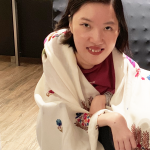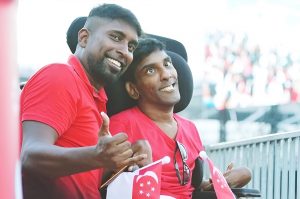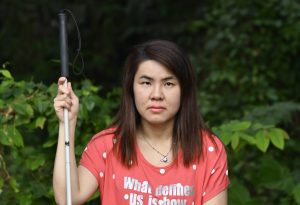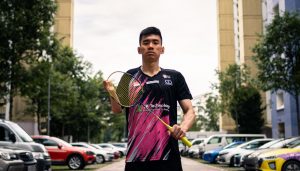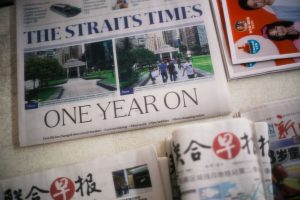Top image: Flag of the Rights of Persons with Disabilities/Wikipedia
“Following Covid-19, many people have asked me how I was able to stay at home for extended periods,” 22-year-old Jolene related. Though she couldn’t see me, I nodded at her reply on my screen with the same understanding we shared as childhood friends. “Now that we are all in the same boat, it’s strange that the disabled and chronic illness community is in the position of being experts.”
I paused. Expert is a novel self-descriptor for a disabled person. It’s rare for the disabled to be considered “experts,” given the barriers historically erected against us at every intersection of modern life around the globe and at home, from education to socialisation. With the relative little of life we have access to, the label feels too large to fit.
ADVERTISEMENT
Yet navigating the world with illness—as every country is now trying to do with Covid-19—is an area of life we’ve developed a unique expertise on.
After all, while governments were flip-flopping on mask mandates in the pandemic’s early days, many immunocompromised or who had weak respiratory systems were already in full, or semi self-imposed lockdowns, Jolene and I included.
(Re)defining disability and “Expertise”
Unless you know someone with a disability, you may be unaware of the paradigm shift caused by Covid-19 for people with disabilities—particularly for those who have chronic illnesses or rare diseases that weaken our stamina, immune responses, and respiratory systems.
Jolene and I bear such a double-whammy: We both have spinal muscular atrophy (SMA), a rare disease that weakens our voluntary muscles and lungs over time, and chronic pain as comorbidity.
Disability is conventionally believed to be a consequence of biological and personal lack. However, it is more complex, with factors outside one’s control contributing to the disabled’s state. As the United Nations Convention on the Rights of Persons with Disabilities emphasises, disability is a person’s health condition interacting with their environment.
Once Covid-19 created an environment where everyone had to mitigate health risks, the disabled, whose health conditions necessitated this very environment, adapted ahead of the curve.
While others struggled to adjust, we felt entirely at home with strict hygiene routines, masks, quarantines, learning about the virus, and solving all the problems that came with isolation.
For some of us, life even got better. Widespread normalisation of digital access to education, employment, and social activities freed us, along with society’s discovery of the disabled experience.
Barriers lifted by lockdowns
When planning for this piece and who I’d interview, Jolene was the first person who came to mind. After childhood, our lives went in different directions, but I’d heard she was soon graduating from Nanyang Polytechnic and starting her first job in 2020. As someone who shares her disabilities but was homeschooled and could do my job from home, I wanted to know how different her experience of the pandemic was.
“I honestly didn’t expect distance-learning or remote work to one day be possible and so widely accepted. When I had to travel every day, I thought I’d literally die,” Jolene joked wryly.
Jolene is only a year younger than me, but SMA causes her to be easily fatigued. Nanyang Polytechnic shifting to a hybrid scheme of in-person and online classes because of circuit breaker measures was incredibly helpful in her final year. Not needing to travel to and fro and be in school the entire day, she could take breaks whenever her body demands rest. As a result, her overall health improved, as did her productivity and the quality of her work.
The benefits of the circuit breaker measures didn’t end there. After graduation, Jolene was relieved she could apply for jobs and be interviewed online. The option saved her time, energy, and money. The ableist discrimination against her was also felt less keenly. This significantly boosted her confidence.
“I felt I was judged more fairly, since only my voice and face were present, rather than feeling like I was degraded by the interviewer for being in a wheelchair—as is common for me.”
Jolene’s experience echoes my own and the experiences of disabled communities worldwide. For years, disability advocates have begged for remote options and flexible schedules for education and employment to be widely available, to no avail.
Our relief and vindication when the world proved our wishes possible in 2020 was one that was mixed with frustration and anger.
I was among the bitter ones. Unlike Jolene, I had to ask my doctor to write a letter exempting me from formal education. I was hospitalised too often, and Singapore’s education system was too rigid for the unpredictable nature of my condition—I stayed home for months due to flu seasons and chronic pain. Even stable employment seemed like an impossibility, that is, before I started writing.
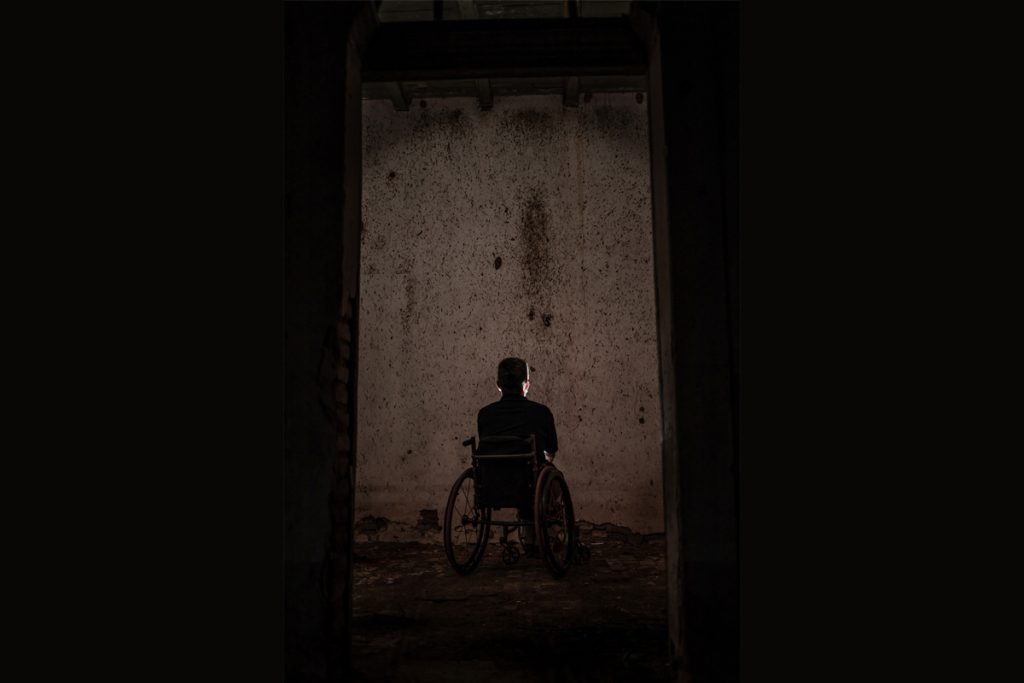
Untapped strength from an unseen minority
The relative ease with which disabled people have rationalised and dealt with the pandemic’s ramifications begs the question: Why haven’t governments engaged us in the fight against Covid-19? This is especially so in Singapore, whose response to Covid-19 was lauded internationally as a model to follow.
ADVERTISEMENT
Still, not long after the Delta variant arose, Omicron emerged. And then, there’s “Long-Covid” inflicted on sufferers of the virus—a disabling force, impairing carriers’ bodies months after they’ve contracted Covid-19, leaving them unable to perform regular activities, regardless of age. Mental illness is also increasingly prevalent due to stress and isolation, in addition to rising unemployment rates. Healthcare experts are puzzled over the virus’s long-term effects and its statistics—it’s all interconnected.
Clearly, a shift in perspective and policies is needed.
The Ministry of Social and Family Development estimates that Singapore’s largest disabled population is the elderly, at 13.3% of our total population. The elderly are also the most vulnerable to Covid-19; it makes sense for pandemic campaigns to feature and target them. However, with 3.4% of Singaporeans aged 18-49 and 2.1% of Singaporeans below 18 considered disabled and among the most vulnerable, I’ve not found our struggles featured or targeted in any pandemic campaign, except where charity is concerned.
Singapore’s disabled youth and working population are just as vulnerable against Covid-19. If we’ve trained our entire lives for the pandemic’s environment, and if we can identify weaknesses in public systems and private entities that could lead to the virus spreading, then where are we?
It’s not as though our government is unaware of the power of representation—the Goh Chok Tong Enable Awards is one of the multiple new initiatives highlighting the accomplishments of disabled individuals—but we must include the collective’s abilities in the public eye. Every disabled person knows we have to treat our ailments holistically; Covid-19 warrants the same approach.
Persisting post-grad problems
“I actually made a request to work from home fully, instead of going to the office two days a week at my [first] job,” Jolene shared when I asked what work was like at her first job.
“My supervisor didn’t allow it. They said it’d be better for me to meet and talk to people instead of being cooped up at home every day. They said it’s not healthy. I know they meant well, but they weren’t disabled, so they didn’t understand my immune system is weak, and I’m more prone to catching viruses. This was when Covid-19 happened.”
Baffled, I asked for clarification. “Was this when the lockdown was lifted?”
“Yes, this was a while after the lockdown was lifted,” Jolene replied. “It was frightening to risk my health by just being outside. Later, there was news that someone from my workplace contracted Covid-19. They had to close for a day to do intensive cleaning. All the more reason I didn’t want to go back.”
The kicker? Jolene was a Social Media Assistant for a local social enterprise whose goal was to uplift, train, and employ people with disabilities. She could have managed the enterprise’s social media and built and optimised their websites from the comfort of her home. Instead, she risked her health for her job, was overworked, and felt underpaid.
Jolene soon left the enterprise. She now feels she is compensated more fairly at her current job.
How Jolene was treated at her former job contrasts starkly with the treatment I’ve received from my primary employer. At the recommendation of my friend and fellow activist, Brianna Albers, I applied for a columnist position at an online publication, SMA News Today. Its parent company, BioNews, is built for and by rare disease patients and headquartered in the US.
I’m still with BioNews. With disabled people helming leadership, prioritising the wellbeing of staff is core to their work culture. Fair pay, a network of people already working remotely, and understanding leadership helped us sail through the pandemic’s storms with relative ease while other companies struggled.
Twice this year, a component for my ventilator needed replacing. Knowing my salary could cover the cost eased my anxiety, as did the assurance that my position would be held for me if I had a medical emergency. Bear in mind that I was a new hire, and the pandemic was in full swing, causing companies to downscale.
The strength of a collective
In 2016, American disability activists Alice Wong, Gregg Beratan, and Andrew Pulrang created the hashtag #CripTheVote on Twitter after noticing the lack of attention disability received in US politics. The hashtag’s use was encouraged by other disabled Twitter users, and by 2020, they hosted their first Twitter town hall with then-presidential candidates Senator Elizabeth Warren and Mayor Pete Buttigieg.
Theirs is a story of a disabled community pushing the needle. It makes one wonder what we can do in Singapore.
Of Singapore’s population, 84.4% are social media users. If the disabled could tell our stories and be given a boost online, could we also help vaccination efforts? Would cultivating empathy for the most vulnerable and showing we’re vaccinated be more effective than a campaign featuring Phua Chu Kang, which, let’s be honest, we only vaguely remember anyway? Could we dispel conspiracy myths the government refuses to address?
ADVERTISEMENT
That’s just one way we could help. The disabled also know tips and tricks for quarantines, unconventional socialisation, financial strategies when healthcare affects bank accounts, resources for mental health, and support groups. We understand that living with an illness is complicated and tiring, but it’s still a life worth living.
As Jolene noted: “Our economic and social situations and relative ability to protect ourselves affect our vulnerability too. We need extra protection and full inclusion in plans to fight the pandemic.”
But for us to do our part, our fellow Singaporeans must do theirs too. Wearing masks and getting vaccinated is just the start. Amplifying our voices and examining ableist attitudes is the next step. We may not be able to eradicate Covid-19, but we can add to our strength against it. Someone just needs to ask.


